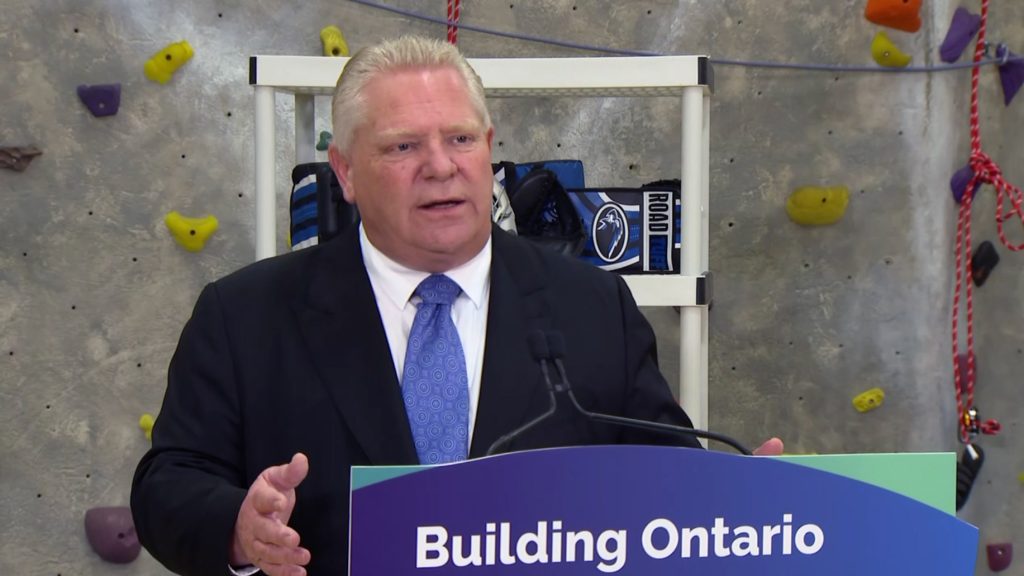Doug Ford named new Ontario Progressive Conservative party leader
Posted March 10, 2018 8:47 am.
Last Updated March 10, 2018 11:23 pm.
This article is more than 5 years old.
Doug Ford is the new leader of Ontario’s Progressive Conservatives.
The announcement comes after a delay that lasted more than seven hours as party officials reviewed the results of the vote.
Ford becomes the leader of Ontario’s official opposition and will lead the charge to unseat Liberal Premier Kathleen Wynne in an election that’s just three months away.
He defeated opponents Christine Elliott, Toronto lawyer Caroline Mulroney and social conservative advocate Tanya Granic Allen to secure the leadership.
“I will get our party back on track,” Ford said. “To the people of Ontario, I say relief is on its way. And to Kathleen Wynne I say your days as premier are numbered.”
Ford replaces Patrick Brown as leader after he abruptly resigned in late January amid sexual misconduct allegations, which that he vehemently denies.
Ford’s coronation as party leader marks the culmination of a tumultuous six weeks in Tory circles that began late in the evening on Jan. 24.
That night Brown, who had been comfortably beating the Liberals and NDP in pre-election polls, called a late-night news conference to deny allegations of sexual misconduct, only to step down as party leader hours later while still maintaining his innocence.
His abrupt departure uncovered issues with the party’s structure, problems with its nomination processes, and discrepancies in its membership numbers, leading the Tories’ interim leader to declare he would “root out the rot” before handing over the reins to a new leader.
The party has since reopened two nominations in contested ridings and abandoned a legal battle with a former party member who clashed with Brown over the nominations and other issues.
The Tories have also upgraded their IT system in response to a cyberattack last fall and cut undisclosed contracts in their effort to move past the wave of controversies that has drawn national attention in recent weeks.
The leadership race itself has also stirred strife and forced party brass to defend their decisions on a number of fronts.
Tensions grew when Brown, fresh off a campaign to clear his name, announced he would throw his hat in the ring in an attempt to reclaim his job. His conduct as leader and status in the June election had already taken centre stage in the leadership campaign and stirred debate among those hoping to succeed him.
Some of Brown’s rivals initially denounced his candidacy, calling it a distraction, but then stepped back to focus on their own campaigns. Mulroney, however, called for him to back out of the race, which he eventually did, citing the strain on his friends and relatives.
All four candidates have also raised the alarm over possible membership fraud and delays in member registration. The party said it was aware of those concerns and thrice pushed back the deadline for party members to register for the vote.
Ford, Mulroney and Granic Allen pushed for the party to extend the race by a week to allow votes from those who received key documents late, but the leadership election organizing committee said doing so would contravene the party’s constitution.
Ford also alleged party members were sending documents to hand-picked members while excluding others, including his own mother.
Hours after Ford’s claims, a lawyer representing a disenfranchised member of the party filed a legal application seeking to delay the leadership decision by an additional week, in order to give more members a chance to receive their documents and cast a ballot.
Party officials argued that delaying the race would damage its chances in the pending election, adding that the roughly 64,000 people who had successfully voted represented an all-time high for voter turnout.
Superior Court Justice Todd Archibald ultimately sided with the party, dismissing the request to extend the race that had already cost $1.5 million.
Saturday’s delays also prompted criticism.
Cristine de Clercy, an associate professor of political science at Western University, said the party’s laconic performance Saturday was “a dismal failure.”
“This was pretty much the most mishandled party executive communication exercise I’ve ever witnessed on television,” she said. “This party is very clearly very fractured … That made it even more important that this executive running this election had to be perfect. There’s not even the latitude for error that a normal party might enjoy,” she said.
“Unfortunately the thing blew apart today.”
CityNews’ Cynthia Mullligan and Momin Qureshi of 680 News were live from the Markham Convention Centre.
Click here to follow along on mobile.
Here’s a look at the four candidates who ran to replace Patrick Brown:
Christine Elliott |
|
|---|---|
 “I think it’s really important that we remember why we’re all here. We all have to come together when this is all over because the star target here is Kathleen Wynne, not each other.” |
Of the four candidates in the race, Elliott is the only one accustomed to life in the provincial legislature.She served as a member of provincial parliament from 2006 to 2015, representing the riding of Whitby-Oshawa. She’s also a veteran of past leadership contests, having mounted two unsuccessful bids to helm the party. Her last effort came in 2015 when she lost to Patrick Brown, the man whose abrupt resignation in January triggered the current contest.Before mounting this latest bid, Elliott worked as patient ombudsman for the province, a position that’s left her open to critiques that she accepted a patronage appointment from Liberal Premier Kathleen Wynne. Elliott has noted she was selected by an independent panel and was proud of her work in the position.The 62-year-old – who is also the widow of long-time former federal Finance Minister Jim Flaherty – has positioned herself as the only candidate capable of bringing experienced leadership to the party and mounting a credible challenge to Wynne in the June election. She is viewed as a more moderate conservative than some of her rivals, but has joined them in voicing opposition to a proposed carbon tax that was one of the cornerstones of Brown’s policy legacy. |
Doug Ford |
|
 “I will allow MPPs to draft, bring forward, and debate any legislation that is important to them. The Liberals have set a dangerous and narrow-minded precedent both federally and provincially. I will never put members of my party in a position where they will have to compromise or deny their personal beliefs.” |
His political resume boasts one term as a Toronto city councillor, but Ford arguably has the highest name recognition and strongest branding of all the candidates in the race.
The pugnacious 53-year-old built that brand between 2010 and 2014 while working alongside his notorious late brother Rob, whose scandal-plagued mayoralty of Toronto made him a household name across Canada. Doug Ford, who was the first candidate to announce his bid for the Tory leadership, has built his platform on the same populist themes that propelled his brother into office. He’s campaigned on promises to eliminate government waste, root out corruption, and give voice to the grass roots of the party who he claims have been neglected both by the governing Liberals and the Conservative party establishment. He has frequently touted his experience in the business world as a key asset. In the years before and after his time at city hall, he oversaw operations and spearheaded expansions at the family’s label-making business. Ford, who along with Elliott has led in various polls, has also positioned himself in line with social conservatives by voicing his opposition to abortion and saying he would allow all caucus members to vote with their conscience on policy decisions. |
Caroline Mulroney |
|
 “This election is just too important to jeopardize by playing politics. This isn’t the time to reach into the past. This certainly isn’t the time to be distracted by one person’s problems. This is the time to unite the party.” |
Her political career may be in its early stages, but Mulroney has had exposure to high public office since childhood. The daughter of former prime minister Brian Mulroney has referred to the political discussion that dominated dinner table conversation as she grew up on Sussex Drive. She even enlisted her father to help campaign on her behalf as the race entered the home stretch.
Prior to her leadership bid, however, the 43-year-old lawyer had spent little time in the public eye. She served instead as vice-president of Toronto-based BloombergSen Investment Partners, and used to work at a venture debt fund. She also co-founded the Shoebox Project for Shelters, which collects and distributes gifts to women who are homeless or at risk. Mulroney was the only one of the candidates who had plans to take part in the June election prior to the leadership contest, having secured the Tory nomination to run in the riding of York-Simcoe. During the campaign, which has seen her emerge as a socially moderate candidate with few concrete policy announcements, she has fended off attacks related to her perceived inexperience. She, in turn, has positioned herself as a fresh-faced candidate capable of bringing meaningful change to the party she hopes to lead. |
Tanya Granic Allen |
|
 “We have to address the corruption in our party … The three of you have stood idly by as the party was run into the ground by Patrick Brown and his corruptive practices.” “We have to address the corruption in our party … The three of you have stood idly by as the party was run into the ground by Patrick Brown and his corruptive practices.” |
The parental rights activist and vocal social conservative was a surprise participant in the race, announcing plans to run days before the entry deadline and launching a crowdfunding campaign to help raise the requisite entry fee.
Since then, Granic Allen has emerged as a candidate of strongly held views that cater to the far right. She has openly criticized Brown and alleged he threw the party into disarray while betraying the interests of social conservatives. Her most passionate positions are related to the Liberal sex education curriculum, which Granic Allen derides at every turn and contends is inappropriate for children. During her work with advocacy group Parents as First Educators, of which Granic Allen is president, she has frequently advocated for greater parental control over educational matters. Granic Allen has also criticized some of the Liberals past green energy measures, saying she would cancel contracts and rip wind turbines out of the ground. |
<br/










